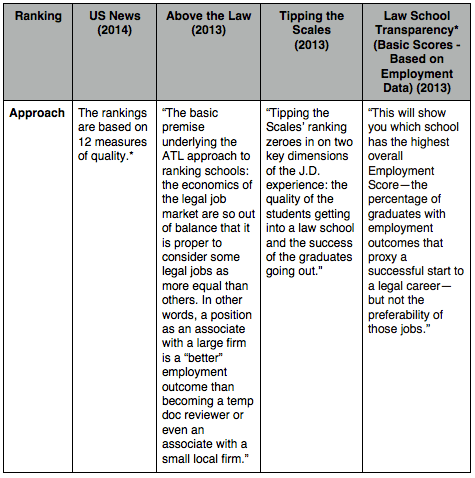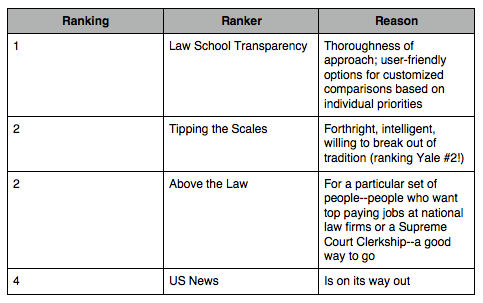Ranking the Law School Rankers
It seems everyone is ranking law schools these days. This year was the first that three institutions put their hats in the ring: Above the Law, Tipping the Scales, and to an extent although it prefers not to use the term “rankings” but Score Reports, Law School Transparency. Below is a look at the differences between them.
*HERE is more info on US News’ Quality Assessment
*Law School Transparency allows you to compare schools on a variety of metrics and makes clear that this list of employment scores shouldn’t actually be viewed as rankings: “Treating the Score Reports like rankings may produce bad decisions. For example, sorting schools by Employment Score on a state Score Report will not provide a quick answer as to the school with the best outcomes in that particular state.”
A few things interested me about these comparisons. First, why does Tipping the Scales rank Stanford over Yale?
“Its students’ post-graduation success—arguably the most important thing to consider when choosing a law school—tips the balance in favor of the Silicon Valley powerhouse. Stanford’s biggest gain comes from the percentage of students who have jobs at graduation: 93.2% compared to Yale’s 90.7%. The median private sector starting salary for graduates of both schools is $160,000, which is typical for elite law schools, but at $62,401, Stanford’s median public interest starting salary is higher than Yale’s $60,000. The difference isn’t enormous, but it breaks Stanford’s way.”
I also noticed that six schools appear on all four lists:
Stanford
Harvard
Columbia
Berkeley
UPenn
UVA
Of these, none of them were ranked the same by all four rankers. So which list to use?
Tipping the Scales notes of the ATL rankings, “[A]n ATL writer conceded, “Honestly, if you want to work in public interest, or at a local, downmarket firm, or something, then the ATL rankings are not all that useful to you. You should probably just go to the cheapest law school you can find and do your best. If you want to help battered women, or help farmers with their estate planning, or start your own law firm, then the ATL rankings are not representative of your hopes and dreams.”
Apart from this helpfully concrete warning, all of the sites are informative in one way or another, and it’s worth reading about their methodology to see which best suits your needs. That said, Law School Transparency appears the most thorough and, rather than aggregating data and ranking it for you, allows you to sort and search based on the criteria that matter most to you. If I were to rank the rankers?


